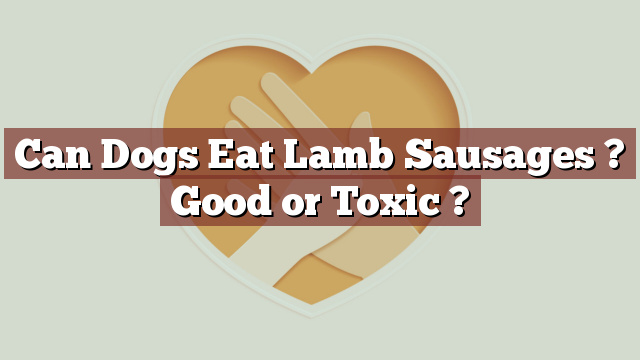Can Dogs Eat Lamb Sausages? Good or Toxic?
One important aspect of responsible pet ownership is knowing which foods are safe for our furry friends. While it can be tempting to share our meals with our dogs, it is crucial to remember that not all human foods are suitable for their consumption. Lamb sausages, in particular, are a popular dish among many households, but can dogs safely indulge in this flavorful treat?
Nutritional Value of Lamb Sausages for Dogs
Lamb sausages are a good source of protein, which is essential for a dog’s overall health and wellbeing. Proteins aid in muscle development, repair, and growth, as well as promoting a healthy coat and skin. They also provide essential amino acids that contribute to the proper functioning of various bodily systems.
In addition to protein, lamb sausages may contain other ingredients such as spices, salt, and preservatives. These additional components should be taken into consideration when determining if the food is safe for canine consumption.
Can Dogs Eat Lamb Sausages? Safe or Toxic?
No, dogs should not be fed lamb sausages. Despite their protein content, lamb sausages can pose several risks to dogs’ health. One primary concern is the high fat content found in most sausages, which can lead to pancreatitis, a potentially life-threatening condition in dogs. Additionally, the seasonings and spices used in lamb sausages can be irritating to a dog’s digestive system and may cause gastrointestinal upset or even allergic reactions.
While some dogs may be able to tolerate small amounts of cooked lamb, it is essential to avoid feeding them lamb sausages specifically. The seasoning, high fat content, and potential inclusion of harmful ingredients make it an unsuitable choice for canine consumption.
Potential Risks and Benefits of Lamb Sausages for Dogs
As mentioned earlier, the high fat content of lamb sausages can lead to pancreatitis in dogs. Pancreatitis is an inflammation of the pancreas that can cause severe abdominal pain, vomiting, diarrhea, and loss of appetite. This condition requires immediate veterinary attention and can be life-threatening if left untreated.
Furthermore, the spices and seasonings used in lamb sausages can cause digestive upset in dogs, leading to symptoms such as diarrhea, vomiting, and abdominal pain. Some dogs may also have allergies or sensitivities to certain spices, exacerbating these symptoms.
On a positive note, lamb itself can be a nutritious protein source for dogs when prepared and cooked properly. It is important to ensure that the lamb is lean, cooked thoroughly, and free from any seasoning or additives that may be harmful to dogs.
What to Do If Your Dog Eats Lamb Sausages
If your dog accidentally consumes lamb sausages, it is crucial to monitor their behavior and health closely. If they exhibit any signs of gastrointestinal distress such as vomiting, diarrhea, or abdominal pain, it is recommended to contact your veterinarian immediately.
In cases where a small amount of lamb sausage has been ingested and no immediate symptoms are present, it is advisable to watch for any changes in behavior or appetite over the next 24 hours. Providing your dog with plenty of water and a bland diet, such as boiled chicken and rice, can help alleviate any potential digestive upset.
Conclusion: Considerations for Feeding Lamb Sausages to Dogs
In conclusion, dogs should not be fed lamb sausages due to the high fat content, seasonings, and additives that can be harmful to their health. While lamb itself can be a nutritious protein source, it is crucial to prepare it without any harmful ingredients and to consult with a veterinarian regarding the appropriate portion size and cooking methods.
As responsible pet owners, it is our duty to prioritize our dogs’ health and wellbeing by providing them with a balanced and appropriate diet. By understanding the potential risks associated with certain foods, such as lamb sausages, we can ensure our furry friends live long, happy, and healthy lives.
Thank you for investing your time in exploring [page_title] on Can-Eat.org. Our goal is to provide readers like you with thorough and reliable information about various dietary topics. Each article, including [page_title], stems from diligent research and a passion for understanding the nuances of our food choices. We believe that knowledge is a vital step towards making informed and healthy decisions. However, while "[page_title]" sheds light on its specific topic, it's crucial to remember that everyone's body reacts differently to foods and dietary changes. What might be beneficial for one person could have different effects on another. Before you consider integrating suggestions or insights from "[page_title]" into your diet, it's always wise to consult with a nutritionist or healthcare professional. Their specialized knowledge ensures that you're making choices best suited to your individual health needs. As you navigate [page_title], be mindful of potential allergies, intolerances, or unique dietary requirements you may have. No singular article can capture the vast diversity of human health, and individualized guidance is invaluable. The content provided in [page_title] serves as a general guide. It is not, by any means, a substitute for personalized medical or nutritional advice. Your health should always be the top priority, and professional guidance is the best path forward. In your journey towards a balanced and nutritious lifestyle, we hope that [page_title] serves as a helpful stepping stone. Remember, informed decisions lead to healthier outcomes. Thank you for trusting Can-Eat.org. Continue exploring, learning, and prioritizing your health. Cheers to a well-informed and healthier future!

